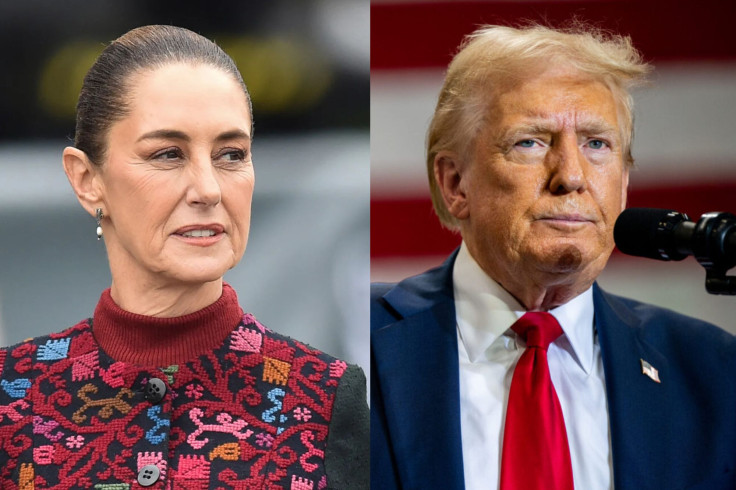
President Donald Trump delayed imposing 25% tariffs on Mexican goods until March 4th, but the matter with its southern neighbor is far from over as the Republican imposed blanket tariffs on steel and aluminum and ordered "country by country" assessments aimed at adjusting relations to reduce the U.S.'s trade deficit.
The U.S. and Mexico have been there before, as Trump also threatened then-Mexican president Andrés Manuel López Obrador with tariffs during his first term. But according to political analyst and professor at Baja California's CETYS University Saúl Sandoval, the approach being taken by the Claudia Sheinbaum administration is not the correct one.
"Back then, he asked President López Obrador's administration to place more emphasis on controlling migration, which he eventually did," said Sandoval during an interview with The Latin Times. "This time around the relationship is much more complicated as the White House claims that Mexican drug trafficking organizations have 'an intolerable alliance with the government of Mexico'. The imposition of tariffs is not so much a commercial issue this time around but a national security one," he added.
The accusation that Sandoval cites took place on February 1st and was met with a swift rebuttal from the Sheinbaum administration, which accused the White House of "slander" and suggested that "if there is any such alliance, it exists in the gun shops of the United States that sell high-powered weapons to these criminal groups."
The back-and-forth is the latest example of the tense episodes that have taken place since Trump's inauguration. Sandoval said the episode reveals that "the U.S. likely has strong evidence if they are making such bold diplomatic statements." "They have very specific information about potential government collusion with cartels, which is why they feel so empowered to try to extract more from Mexico." "He is using Mexico as a political piñata," Sandoval added.

The exchange between both governments is also the latest piece of evidence of Sheinbaum's decision to stand up to Trump. She has emphasized that relations will be based on "coordination, not subordination."
Her rhetoric has garnered both praise and criticism, a clear reflection of a country which "has become tremendously polarized since the AMLO administration," as Sandoval puts it. On the one hand, many are applauding her attitude, calling her brave and "lauding that she goes head-to-head against the bully."
But on the other hand, there are some, like Sandoval himself, who question the benefits of the strategy in an asymmetrical relationship:
"In very general terms, Mexico's economy represents about 7% of the size of the U.S. economy. So, it is to be expected that, as the leader of Mexico, you should have a different strategy. My perspective is that there has been a lack of diplomatic finesse, and that it does not help to criticize the U.S. government, especially given the nature of President Trump's personality. If he hears criticism, he will only become more aggressive."
As it stands, everyone from owners of border factories to Mexican farmers are navigating through a tense calm, awaiting the matter between both countries (and the rest of the world) will unfold. Industries such as the automotive are poised to suffer heavily due to its complex supply chain, with Ford CEO Jim Farley recently saying that a "long term tariff across the Mexico and Canada borders would blow a hole in the U.S. industry that we've never seen." Others are also facing uncertainty amid the recently announced 25% tariff on all steel and aluminum imports into the U.S.
"Companies are now analyzing short-, medium-, and long-term scenarios," explains Sandoval. "In the short term, they are likely being cautious, waiting to see how the tariff threat unfolds. If tariffs are indeed imposed, businesses will need to reassess their strategies, perhaps relocating from Mexico to the U.S. to take advantage of incentives. But they'll likely wait at least through the first half of the year to see how the tariff dispute plays out."
Tariff threats come at a difficult moment for the Mexican economy, which could technically fall into a recession if the current quarter results in negative growth. As Sandoval points out, the legal security necessary for investments and businesses to flourish is and has been in peril for a while, making it difficult to be optimistic about the future:
"One of the most significant changes in the last few months was the judicial reform, which, starting this year, means judges, magistrates, and even federal-level positions will be elected through popular vote. That has already sent worrying signals to investors because it will necessarily politicize the judiciary. Through their congressional majority, the government also dismantled autonomous bodies overseeing monopolies, transparency, and government accountability. This has created an environment of fear among investors"
With planning more difficult, tariffs will likely hold back investors even further. "It's like rehearsing a play and then suddenly the lights go out, and you're left with candles and flashlights, trying to keep the show going," Sandoval illustrates.
The threat of a tariff war also arrives amid another type of war in Mexico: the Sinaloa turf war. Since early September, hundreds of people have either lost their lives or disappeared as two Sinaloa cartel factions —"Los Chapitos" and "La Mayiza"— declared war to each other for control of the criminal organization known as the Sinaloa Cartel.
Besides the aforementioned accusations of collusion between cartels and the Mexican government, Trump and his allies have been touting a potential "soft invasion" of Mexico since back in November, a plan that would entail sending troops across the border to eliminate cartel leaders and operatives. Just this week, newly-minted Secretary of Defense Pete Hegseth doubled down on the idea, warning that the U.S. reserves the right to move against cartels in Mexico if it believes the country is not doing enough on its end.
Unsurprisingly, Mexican public opinion is divided in the face of the idea of a soft invasion by the U.S., according to Sandoval:
"Some, who align with the ideology of the current government, and others with nationalist sentiments, are obviously against any kind of invasion in the country, citing national sovereignty concerns. However, there are other groups of people saying: 'well, if the evidence shows that local, state, and federal governments have been unable to address this issue—one that is so real, so daily, and so constant—then maybe we do need someone, a third party, to at least try to reduce the problem"
Sandoval hopes that both administrations don't lose sight of the ultimate victims of a potential tariff war: consumers. For Americans, for example, it could mean the rise in costs of everything from cars and cart parts to fresh vegetables and beers. But Mexicans also have a lot to lose by going tit for tat:
"Mexico must be very careful when it comes to imposing reciprocal tariffs. It must be very selective, because if it does so, who will it affect? It will also affect us as Mexican consumers. I believe the Mexican government should define its position but not engage in attacks or rhetoric. This kind of discourse does not help and actually does more harm"
© 2025 Latin Times. All rights reserved. Do not reproduce without permission.













